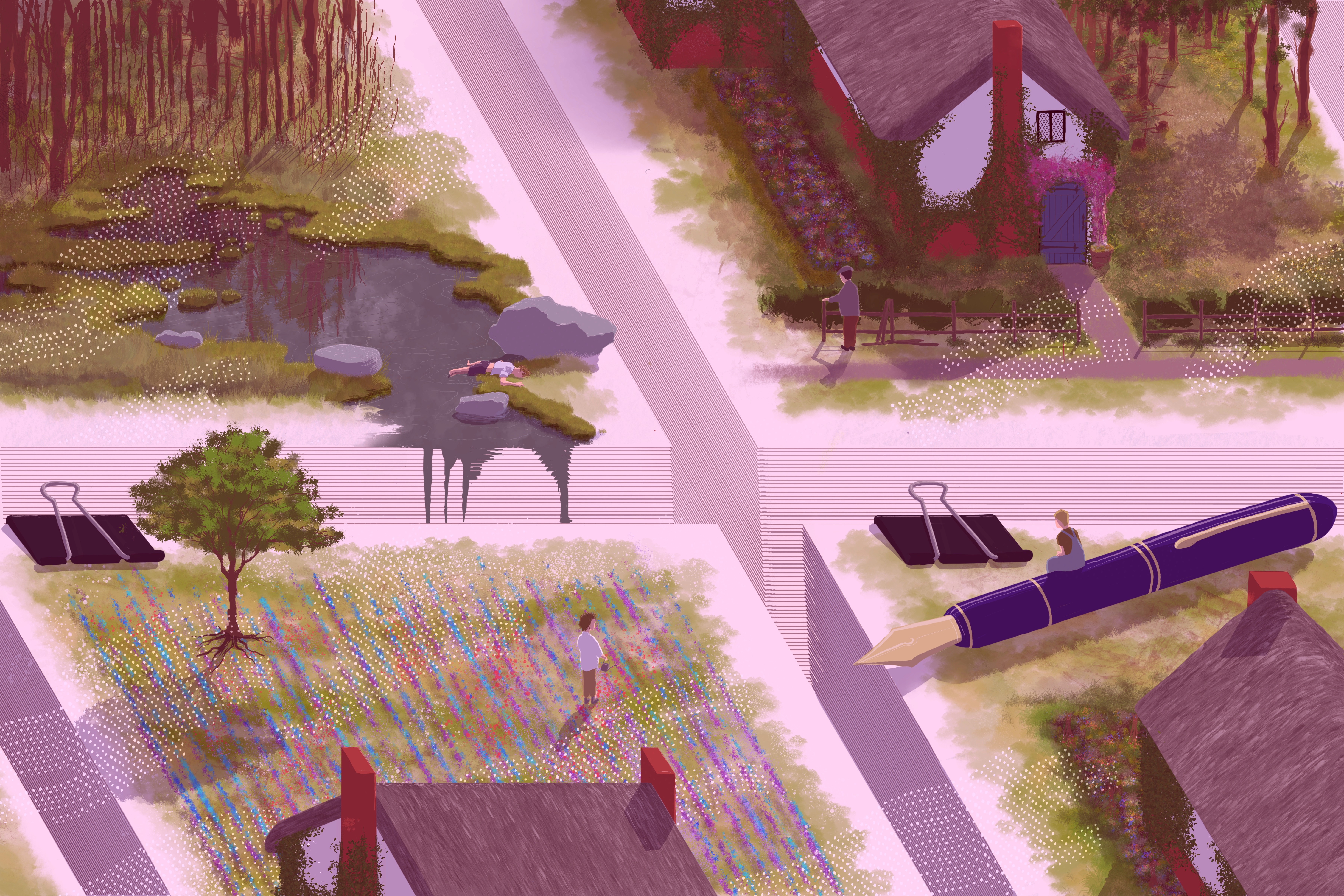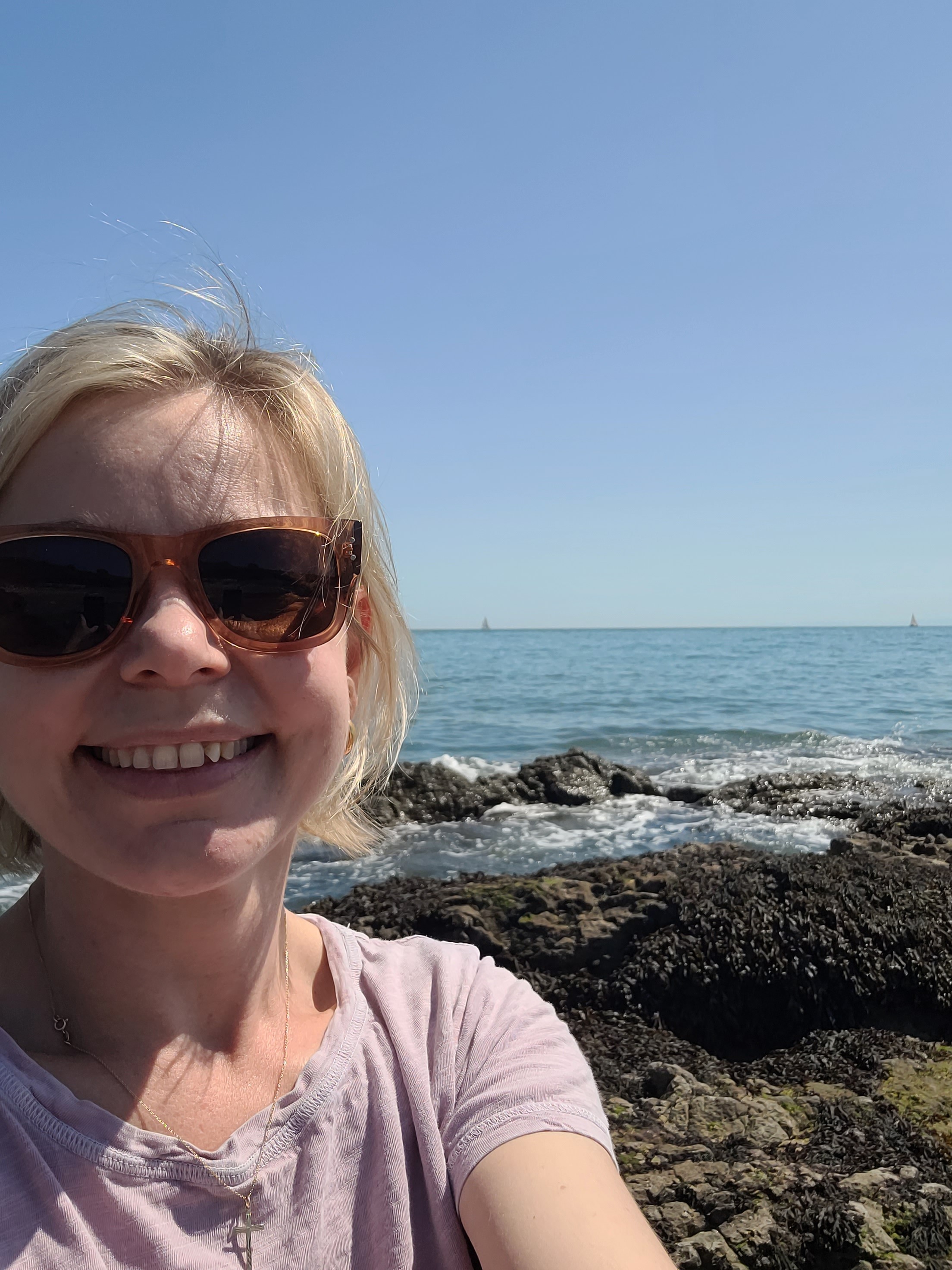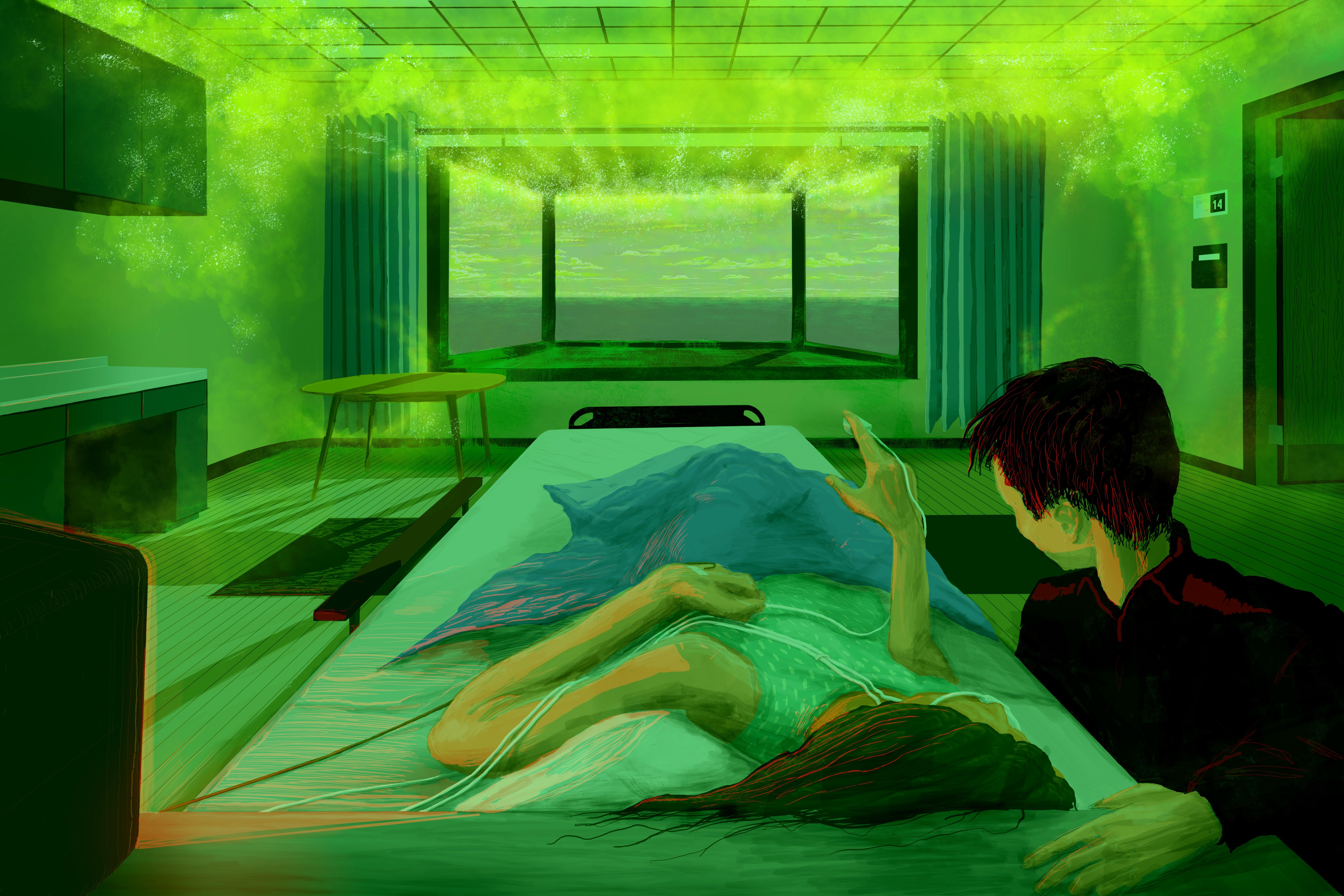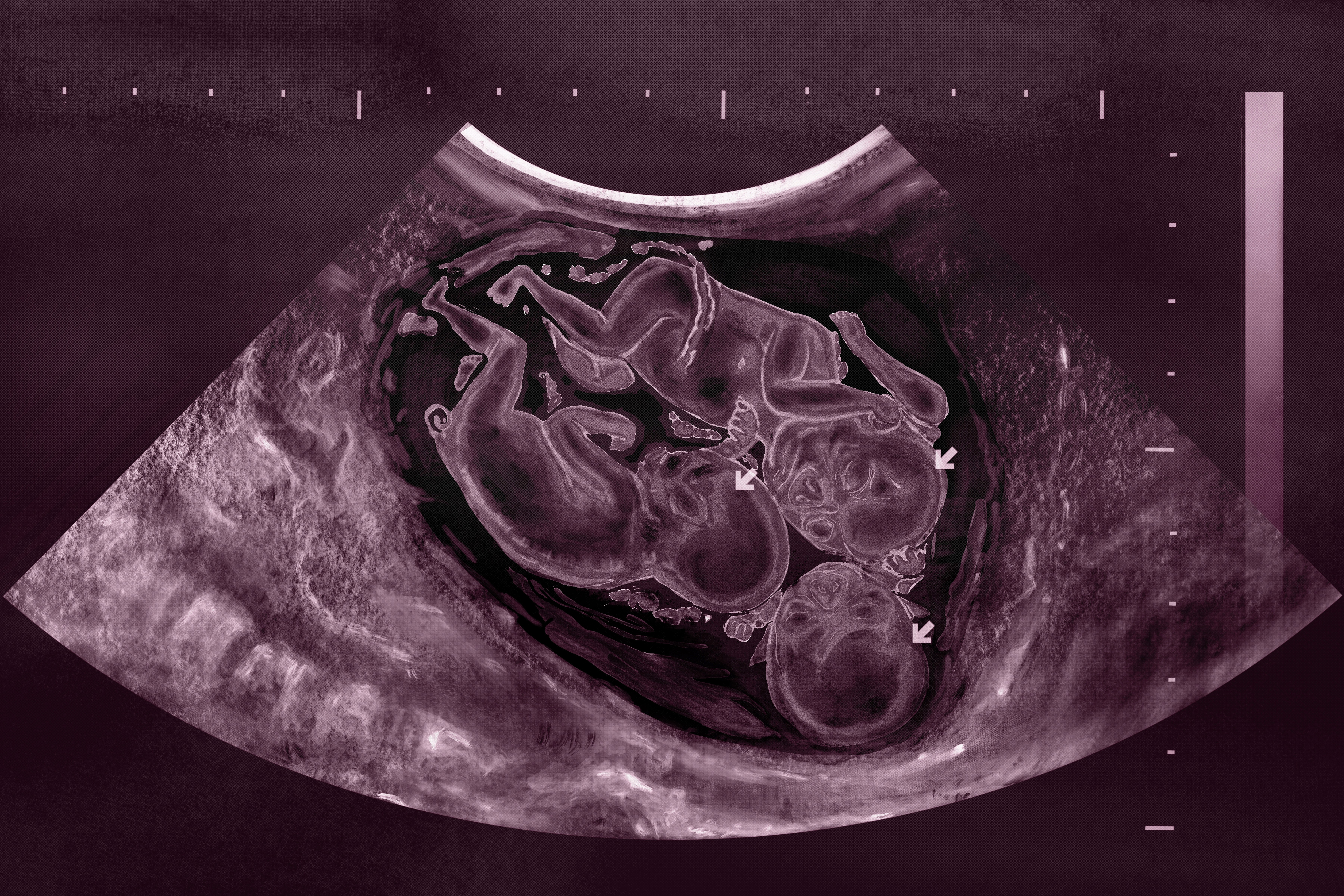The Year of Bountyfortitude
by Georgia Boon

Georgia Boon’s future pastoral drifted in through the window of my trailer (where I’ve often retreated throughout the pandemic). There, it lodged itself in me with a caution: Despite all of the knowledge we’ve gained, a return to paradise could still incur a debt of innocence.
I had been afforded my one acre, along with everyone else, at the advent of the first year of Bountyfortitude. Nobody could ever say that it was anything but a utopia, that it was anything less than perfect. Mine was a sunny plot. I chose to sew it with wildflowers and grasses, and now, at the year’s end, the meadow was thick with cow parsley, larkspur, and clumps of pendulous sedge lurking at the boggy end.
I started to feel out of sorts the day before the papers were due to be approved. The thick packet, punched with official stamps, had been waiting on my desk for weeks past. I had no reason to expect that on the day appointed for signing that I would do anything but mark my name with the presidential fountain pen at the bottom of the last page and have done with it. There was no choice but to continue with the plan.
The pollinators were out when I first began to feel unwell. Thousands of tiny white plastic motes skimming across the meadow. Nothing as beautiful as bees, the demonstrators' signs had said. I hadn’t been sympathetic to their protests. How were bees any more beautiful than the beetles that my brother endlessly sketched when we were children, the soft sound of his pencil shading reaching down to me from the top bunk? Those were all gone, too.
The protestors had been right in their complaints that the pollinators were unsightly; an invisible solution would have been preferable. But the Executive Committee concluded that the citizens wouldn’t believe in anything they couldn’t see, and I'd backed their decision. I tugged the window closed, and flinched a sudden tenderness in my shoulder.
I wondered at where the pain could have come from, rubbing my arm. It couldn’t have been an injury. I hadn’t lifted or dug anything for months. My daily patterns were constrained to the studying of reports and documents. My thighs were stiff and there was a weakness in my back as I sat down in the old chair. I had no choice but to close my eyes and let my head drop to whatever had suddenly overtaken me.
I woke, reaching for my neck. My fingers met skin slick with sweat and all of me hurt. The view outside and the light from the window had shifted; the night was settling its stars. The pollinators were gone and there was a true silence.
What could have contaminated me? I hadn’t seen another person since The Year had begun. I looked out again into the meadow. Perhaps a predatory grass had sprung up, or a hogweed with poison pustules dotted along its invisible thorns. In the morning I would search the acre for any such thing tucked away, waiting to share its venom. But now I would search myself, hoping that the sickness wouldn’t overcome me before I was rendered immobile. My hands shook, clutching to surfaces, trying to steady myself in a house that now seemed both full of obstacles and lacking the props I needed to keep upright.
I lurched into the bedroom, heavy and swaying. The bottom drawer of the bedside table was stiff, my arm uncooperative. But there it was inside, glinting in some unseen light, heavy silver. I hadn't kept the mirror out of vanity, but because it was the only keepsake I had left of my mother since Bountyfortitude. I studied my brother’s engraving on the lid, a note etched on his gift to her, given years back.
Don't forget, you are a part of it all. Love, Robin.
Twisting myself back to front, dangling parts of me before the tiny reflective disc revealed no sign of injury or swelling. I looked all around the inside of my mouth, inspected my neck. Nothing. I combed the small of my back with my fingers, searching for aberrations where I couldn’t see. And there it was, a tiny pip, poking out. Angling the mirror revealed the edges of the source of my pain, a glowing red bullseye rash hot to the touch.
I moved carefully, not wanting to knock the tick out, leaving the head behind to spread it’s disease further through me. The tweezers were back in the main room, on a little tray filled with iris seeds, leathery and plump in their husky brown pods. I reached around, feeling out the invader again, and dug into my flesh, grasping at the unseen parasite. With a decisive tug, I snatched the whole thing out: a vampiric dot, fat with blood.
The risks associated with a tick outbreak had occasioned reports that, if stacked, would reach yards into the air. The Chief Scientist advocated for a targeted extinction through the mass release of spiders into grasslands. The Strategy Advisor had rasped at him for using the ‘s’ word. The polls that charted the appetite for the levels of control and isolation that citizens would tolerate had highlighted the modeled spider increase as a dominant fear. Adding more spiders to the mix wasn’t a recommendation anyone could support. The ticks would have to propagate and we would manage their impact on our own.
I dragged myself up and hunted through the cupboards for anything that contained flavinoids. That would smooth the fever out a little. And some water. I found lemon juice, a can of clementines and some dried blueberries. I tipped them all into a bowl and sat on the couch and drank, and then I lay down.
I didn't dream, but I saw.
It was the afternoon that Robin and I had run past the meadow and into the woods and then gone beyond. Mother had sent us to fetch something from town, her usual strategy when she wanted some peace. As soon as we were out of the front door, Robin turned to go up the hill, away from town and toward the meadow.
“What are you doing?”
“It’s not the right day for town today,” he said.
“Rob, we can’t just not go!”
“Town will still be there when we come back.”
He could spend hours in those meadows, lying flat on his stomach and tapping his feet as he watched a host of invertebrates scaling stalks and battling for the tiny specks of energy they needed to keep moving, to stay the endless, complicated dance that meant that the world had life. I preferred to sit, observing him, keeping my stomach and hands free of bites and rashes. He had no such fear. If he found a molehill, he would sniff at it, place his hands on top to feel if it was warm. And whenever he saw one of the vivid purple pyramid orchids that mother loved so much, he tipped himself upside-down to look at all of the tiny stems in formation.
Today, Robin wanted to explore. First, into the wood beyond the meadows. As ever, his scrutiny made all the otherwise dull things interesting. Creepers locked in deadly battle with saplings; birds carrying decorating supplies to hidden nests. And the epics of pollination, the quest for survival, the colonizing plans of plants having as much power as an elephant trampling trees.
One vast patch of celandine gleamed, victorious as it covered an especially wide and low bowl deep in the wood. Lonely, feeble shreds of lichen, thwarted at the base of a beech, never achieving dominion over the whole structure. He noticed all of this. But most of all, he loved the fungus, jutting out, trying to be the broadest, the flattest. He would measure them, naming the largest Shield of the Emperor or Mighty Helm.
But today he didn't pause to look at any of this. He marched, his shaggy mop bobbing above his shoulders, tracking between thinner trunks of the small clump of silver birch, beyond four hollies that had locked thorns to form a wall at the edge of the wood.
“Come on, I'm going to show you something new,” he said. There was a thin path that brought us to the edge of the woodland, to a gnarled overgrown field. “This way, like this.” Robin eeled through spikes of barbed wire and metal stars melding at the edge with blackthorn. After teasing a path through the undergrowth, he sprung up again in the middle of another field, now waist-deep in brambles and nettles. “Come under,” he insisted, his face tagged with scratches and stings.
I knelt and peered through the undergrowth but I couldn’t understand how he had seen a way in. It was just a tangle.
“Just start. Start moving through and you'll know where to go.”
I pushed my hands in to part the woody branches, but immediately something barbed my wrist and I withdrew, furious. Storming along the perimeter of the field, stomping my frustration out, I saw a small stretch of hedge that had been cut to make a passageway. Shuffling there under the barbed wire, I could make my way through.
Coming out to meet him, angry, I yelled, “Why didn't you just look for the gap! Then you wouldn't have messed up your face!”
And then I saw his hand: a blister, bubbling up huge, seemingly alien, not even his flesh, glowing like a piece of white hot metal.
“Robin! That needs a doctor!”
“It’s just hogweed. The blisters will go down in an hour or two.”
“Mother needs to see—”
“Stop! Stop fussing,” he cried and brushed me away, striding on and out of the field.
He dipped in and out of unfamiliar hills and humps as I followed. The sky was fierce and darkening and Robin’s inflamed hand flashed pain through the stormy light. I glanced at it with the shame that I hadn’t been able to make him turn around in the first place and return home with me. At the edge of a hill springy with goosegrass we looked out across a new valley, boasting four or five lakes still brimming with water. I hadn’t thought there were any left near us that hadn’t dried up.
Robin slid down the curve of the hollow, and danced around the edges of the lakes. By the time I had reached him, he was flat on his stomach, gazing into the water of the largest pool. Then he combed his hands through the grasses on the shore, lifting stones and crushing leaves with his fingers as he went, gathering up their scent.
“Look,” he said, crouching before an old tree stump made to look like a small wooden throne. “I have something for you.” From somewhere at the rotted base, he pulled a clump of damp leaves, offering them to me. I looked at him with a question.
“Wood Sorrel. Thought you might be hungry.”
I placed a heart-shaped leaf on my tongue. I wondered how that sharp bright apple savour was held in such an ordinary looking plant. Thrusting the rest of the leaves into my hands, Robin crouched there on the stump, poking the roots with a stick.
“What do you want to get home to, anyway? Your equations?” he said when I told him that soon it would be dark, and then there would be nothing to see. “No equation could ever make sense of all of this, you know.” He was wrong of course. We did make sense of it, enough to save it, some of it at least, and ourselves.
When all the lakes were gone, Robin’s hands still bore the abrasions of the hogweed. He never minded.
“Do you remember the smell of the watermint growing by the purple loosestrife?” he would say to Mother years later, holding her hand as she shook her head, lips pressed together. “And the mayfly dancing on the water?” Her eyes were dark, while his shone with the memory. The few encounters with the life of those waters were more to him than the cicatrix on his own hand.
For me and Robin, nature had always been falling. We had always known that it wouldn't go back to how our mother remembered it. He wanted to celebrate everything that remained, watching till the last pondskater danced on the last droplet of lake water. As long as he could roam, his curiosity kept him strong. But it was different for her. She was winded by the loss of hope.
Robin would try to comfort her. “You’re here. We’re here. We’re a part of it,” he would say. He’d had the mirror made for her then. This was doubly illegal: the sand shortage leading to the first mirror ban, the glass removal coming after that.
I had known the plans would be hard on him. I told my mother about them the night before I oversaw their approval, thinking that she would see the facts and see how inevitable it was. Every single dot of data, from the largest population studies to the topographic laser modeling that the space station provided, showed us that aloneness was our best weapon against the death of our home.
“Together, we are three things,” I explained to Mother.
“First, we are unmanageable, too complex in so many combinations. The ways we interact are unpredictable. Can’t be modeled. But alone, in one place, the forecasting works.
“Second, we are jealous. We can’t help seeing others as something we could be. And so we try to consume one another, digest other people’s preferences, what they love, their passions. And we can’t stop.
“But most of all, together, we are just too kind. There is too much love. Parents lavishing too much on their children. Partners wasting resources on people who are beyond hope. We can’t stop giving. And unless we do, there will never be a way back.
“We have what we need to set the reversals in motion. We have the seedbanks. We have the data. All together it can make us a future.” I let her sit with that a moment, holding her gaze. For as long as we looked at one another, her face showed more disgust than acceptance. Despite all her grief, she wasn’t prepared to pay the price.
“Robin will never survive it, being so enclosed,” she said, before calling me a ghastly boy and turning away.
I felt a little better when I surfaced from this mist of echoes. It was night, and the air smelled near fresh, almost like rain. That was what Robin had loved most of all, had missed most of all.
“It was just magic, magic falling to the earth. Think about it. We couldn’t even see it being made, but we absolutely cannot live without it.”
The water harvested from the firmament didn't satisfy him. “Rain isn’t rain if it doesn’t fall,” he said.
I’d shown him the water harvesters during set up. Those preparation weeks had been so busy for me, but I found the time to take him up there, let him see how it was done from the air. But he wouldn’t look up. His eyes were locked on the parcelling taking place below, the formation of the acres, the wire being strung to divide them.
“What will happen when the birds want to fly between?” he asked.
The calculations of the survival rates of the remaining four species did not provide reassurance for him. Robin didn’t make it even half way through these last twelve months. Mother was called to identify him. He lay on his porch, its woodland view was the best aspect I had been able to arrange for him. His body was curled in on itself slightly, no sign of injury. They said it was as though he had simply stopped, finished. They had questions about the scar on his hand, was it recent, connected with his death? It still glowed, even through the maze of scratches on his palms and forearms: stigmata from scaling trees to see out, to see beyond.
Mother wouldn’t let go of him, even when they threatened to use force. They didn’t tell me where they took her. There are only a few facilities now, so I think I can guess which one they would have chosen. A visit, of course, is out of the question.
I shook my head, grunting my way up to reach the table and the papers. The state fountain pen lay on top of the packet. I flicked the cap away with my thumb, clutching the barrel in my fist. I could see Robin’s face, daunted as the door to his shack closed on him, his own acre a prison of earth. The fever was still rumbling through my blood, my eyes were dim. But I could read the words at the top of the document:
The Declaration of the Advent of the Age of Bountyfortitude, in which each person of the land is to be allocated their one acre, never to…
I gripped at the pen. I saw Robin, tripping through the meadow, the grasses dancing in time with his step. Within those allotted lines, I etched the familiar pattern of my name. When I was done, I blew on the wet ink, my breath full of life.


